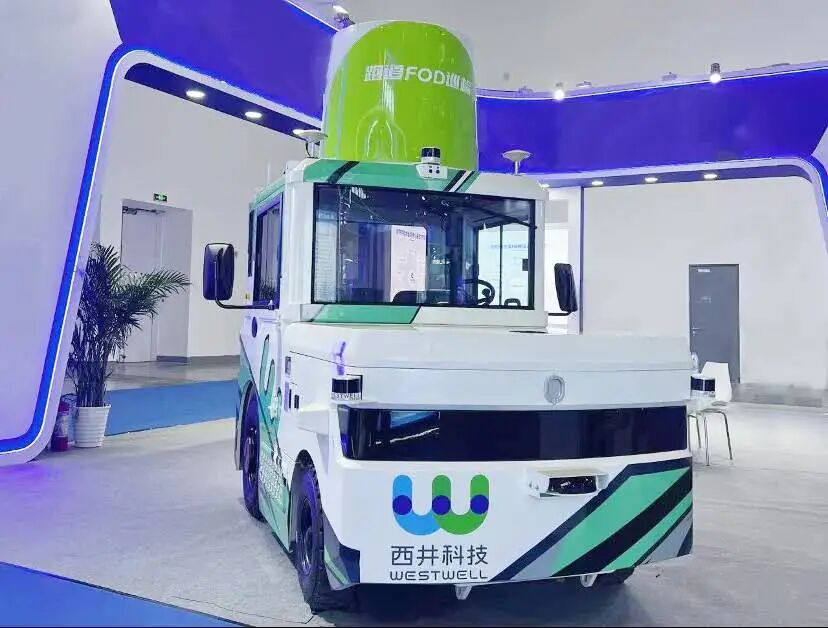Westwell wins bid to deploy AI-powered FOD inspection system at Pudong Airport 发布时间:2025-09-19 信息来源:上海长宁
Westwell, a company based in Changning, successfully won the bid for Shanghai Airport’s mobile FOD (Foreign Object Debris) runway inspection equipment project. It will establish the world’s first application example integrating "AI + autonomous driving + FOD detection" at Shanghai Pudong International Airport.
The project introduces new energy autonomous unmanned vehicles, the Q-Tractor P40, which work in close coordination with FOD detection radar equipment. Leveraging AI-based foreign object recognition algorithms, the system constructs an end-to-end solution of "radar scanning + AI identification" to achieve comprehensive, high-precision, and intelligent detection of foreign objects on airport runways. This initiative is expected to help Pudong Airport become a benchmark for technological innovation in autonomous FOD prevention and control, injecting new momentum into intelligent aviation safety.

CAAC policies promote intelligent FOD detection technology
FOD poses a major risk to aviation safety—objects such as screws, stones, and metal parts can cause engine failures, tire bursts, and other accidents, leading to significant losses. Currently, FOD prevention and control largely rely on manual inspections, which are susceptible to weather conditions, manpower limitations, and other factors, carrying risks such as undetected small objects and non-real-time monitoring.
In recent years, the Civil Aviation Administration of China (CAAC) has issued several documents, including the ”Airport Unmanned Equipment Application Roadmap (2021-2025),” ”Notice on Nine Measures to Comprehensively Strengthen FOD Prevention,” ”Technical Requirements for Airport Pavement FOD Detection Equipment,” and ”Management Measures for FOD Prevention in Transport Airports.” These policies provide top-level design encouragement for the application of unmanned equipment and intelligent inspection technology, offering policy support for the promotion of automated FOD detection technology.
The application of automated FOD detection technology can effectively improve inspection efficiency, accuracy, and environmental adaptability. It also helps airports analyze the patterns, types, and distribution of FOD at the data level, enhancing overall FOD management capabilities. Currently, FOD detection equipment has been deployed and applied at domestic and international airports such as Vancouver Airport, Boston Airport, Singapore Changi Airport, Beijing Daxing International Airport, and Ezhou Huahu International Airport, demonstrating the efficiency of automation technology in FOD prevention and control.
Four core capabilities enhancing airport FOD inspection
The new energy autonomous tractor Q-Tractor, deployed by Westwell in this project, is built on a positively developed new energy intelligent driving by-wire chassis designed for logistics scenarios. It is specifically designed for environments such as airports, industrial parks, and logistics centers. Currently, the Q-Tractor has been deployed at Hong Kong International Airport, Hong Kong Air Cargo Terminals Ltd. (Hactl), and the Sichuan Airlines Cargo Terminal at Chengdu Shuangliu International Airport, forming a replicable and expandable unmanned transportation solution for airports.
Its introduction at Shanghai Pudong International Airport will deeply integrate AI detection equipment and autonomous inspection technology, further elevating the intelligent level of the entire FOD detection process. It will increase the early detection rate of FOD risks and promote the transformation of runway safety management from traditional methods to an "intelligence-driven" model.
The Q-Tractor offers the following core capabilities and functions:
Environmental perception and task execution: Utilizes multi-sensor fusion technology to 360° accurately perceive complex environments. Combined with functions such as automatic start-stop, lane keeping, and intersection navigation, it efficiently conducts FOD inspection tasks.
Endurance and adaptability: With a 200 km range and fast-charging system, it ensures long-term stable operation. It possesses leading L4-level autonomous driving capabilities, enabling deep adaptation to actual airport operational scenarios.
Full-site high-precision maps and electronic fencing: Accurately identifies runways, taxiways, and surrounding facilities in real time, supports dynamic map updates and online maintenance, and effectively adapts to changes in airport layout. It strictly defines driving areas, ensuring vehicles do not enter sensitive zones outside operational routes.
ACC task management: Enables end-to-end digital management of inspection tasks, including task approval, inspection management, vehicle status monitoring, operation record tracing, and statistical analysis, enhancing the intelligence and operational efficiency of airport FOD prevention and control.
In airport runway scenarios, the Q-Tractor will reliably carry out FOD detection radar deployment and intelligent inspection tasks, achieving a transition in runway safety management from "human defense" to "technical defense," and from "passive response" to "active warning," thereby safeguarding aviation operation safety.
Against the backdrop of China’s efforts to build "safe, green, smart, and humanistic" four-type airports, Westwell’s innovative practices highly align with this vision. The entry of its Q-Tractor as an FOD detection radar carrier into Shanghai Pudong International Airport not only pioneers new applications of "AI + autonomous driving" in FOD prevention and control but also demonstrates the reliability of this technology in complex airport environments. It provides critical support for smart aviation and promotes the in-depth development of smart airport construction.